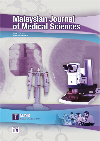
|
Malaysian Journal of Medical Sciences
School of Medical Sciences, Universiti Sains Malaysia
ISSN: 1394-195X
Vol. 17, Num. 2, 2010, pp. 66-67
|
Malaysian Journal of Medical Sciences, Vol. 17, No. 2, 2010, pp. 66-67
Letter to the Editor
Antibody mediated immunity — a missed opportunity
in the fight against tuberculosis?
Armando ACOSTA1, Mohd Nor NORAZMI2, Maria Elena SARMIENTO1
1Instituto Finlay Ciudad Habana, Cuba
2School of Health Sciences,
Universiti Sains Malaysia Health Campus, 16150 Kubang Kerian, Malaysia
Correspondence: Prof. Dr Armando Acosta,
MD, PhD (Instituto Finlay),
Calle 17 esquina 198,
Rpto. Siboney, Playa,
Ciudad de la Habana, Cuba,
Tel: +53(7) 271-6911 ext. 106
Fax: +53(7) 208-6075
E-mail: aracosta2005@yahoo.es
Code Number: mj10024
Dear Editor,
Tuberculosis is one of the leading causes of mortality produced by a single
infectious agent. Each year 8 million new cases and between 2 to 3 million
deaths are reported. One-third of the human population is already infected
with Mycobacterium tuberculosis—the causative agent of tuberculosis.
The disease is increasing at a worrying rate primarily due to the absence of
an effective vaccine, the emergence of multi-drug resistant strains, as well
as co-infection with HIV; coupled with the low diagnostic and therapeutic coverage
in many developing countries.
The role of cell-mediated immunity against mycobacteria, and in particular,
M. tuberculosis has been fully established. Up to now all the efforts for the
development of new or improved vaccines against tuberculosis have been directed
toward the induction of an effective cell-mediated immune response. However,
the potential role of antibodies for protection against M. tuberculosis infection
have been underestimated on the assumption that they have limited effect, if
any, against intracellular pathogens.
M. tuberculosis gains access to the host through the mucosa of lung alveoli,
thus the presence of specific antibodies in mucosal secretions could inhibit
bacterial colonization. In fact, our group has demonstrated the protective
capacity of secretory IgA monoclonal antibodies directed against M. tuberculosis
antigens as well as formulations of human gammaglobulins against models of
infection with BCG and M. tuberculosis in mice (1,2,3). Similar results have
been obtained with human secretory IgA in the same animal model (unpublished
observations). Using different animal models and antibody formulations, other
groups have reported the protective role of antibodies in M. tuberculosis infection
(4).
Potential mechanisms by which antibodies could modify the outcome of mycobacterial
infection could be mediated by interference with adhesion, toxin neutralization,
opsonization, activation of complement, increase in cytokine expression, enhancement
of phagosome-lysosome fusion, and enhancement of antigen presentation among
others (5).
Future applications of antibody formulations for the control of tuberculosis
may include: treatment of patients infected with multidrug resistant strains,
combination with the standard treatment in order to achieve shorter therapeutic
regimes, and administration to recent contacts of tuberculosis patients and
risk groups. Since BCG, the current vaccine against tuberculosis is only protective
in the severe forms of the infection in childhood and is not protective against
the pulmonary disease in adults — the most common form of the disease.
Hence the development of new tuberculosis vaccines is urgently required (6).
The induction of specific antibody responses by vaccination in addition to
the stimulation of cell-mediated immunity could be a novel strategy for the
development of new generation prophylactic and therapeutic vaccines against
tuberculosis. Taking into consideration this possibility, our group has been
working on recombinant BCG strains expressing T and B epitopes of M. tuberculosis,
with some encouraging results with respect to immunogenicity and protection
in mice (unpublished results).
Accumulated reports in favour of the protective role of specific antibodies
in tuberculosis provide us with potential improvements in prophylactic,
therapeutic, and diagnostic methods to enhance future control measures against
the disease.
Acknowledgements
Some of the results presented were kindly supported by MOSTI Grant No: 07-01-05-MEB007.
References
- Olivares N, Leon A, Lopez Y, Puig A, Cadiz A, Falero G, et al. The effect
of the administration of human gamma globulins in a model of BCG infection
in mice. Tuberculosis. 2006;86(3-4):268–272.
- Olivares N, Puig A, Aguilar D, Moya A, Cadiz A, Otero O, et al. Prophylactic
effect of administration of human gamma globulins in a mouse model of tuberculosis.
Tuberculosis. 2009;89(3):218–220.
- López Y, Yero D, Falero-Diaz G, Olivares N, Sarmiento ME, Sifontes
S, et al. Induction of a protective response with an IgA monoclonal antibody
against Mycobacterium tuberculosis 16kDa protein in a model of progressive
pulmonary infection. Int J Med Microbiol. 2009;299(6):447–452.
- Abebe F, Bjune G. The protective role of antibody responses during Mycobacterium
tuberculosis infection. Clin Exp Immunol. 2009;157:235–243.
- Glatman-Freedman A, Casadevall A. serum therapy for tuberculosis revisited:
reappraisal of the role of antibody-mediated immunity against Mycobacterium
tuberculosis. Clin Microbiol Rev. 1998;11(3):514–532.
- Norazmi MN, Sarmiento ME, Acosta A. Recent Advances in Tuberculosis
Vaccine Development. Curr Resp Med Rev. 2005,1(2):109–116.
© Copyright 2010 - Malaysian Journal of Medical Science
|
